| |
|

MONDAY, JUNE 30

Friday, July 11 Congregation Beth El Kabbalat Shabbat Services


FRIDAY, JULY 18 Temple Solel Shabbat at Beach
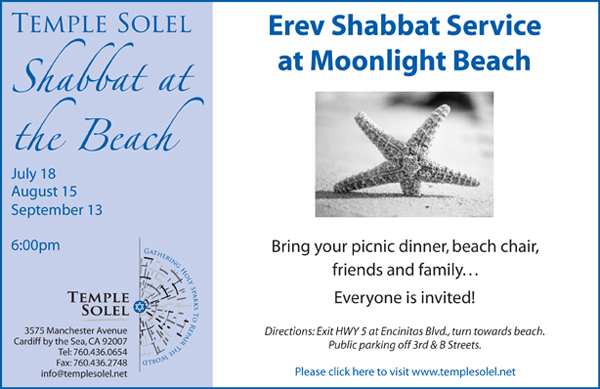

MON., SEPT. 29-THURS., OCT. 9


THE VIEW FROM JINSA
Parallels of German, Iraqi reconstructions
By Shoshana Bryen
 WASHINGTON, D.C.—This month marks the 60th anniversary of the Berlin airlift, an extraordinary moment in American and German history. In The Candy Bombers: The Untold Story of the Berlin Airlift and America's Finest Hour (Putnam Adult, 2008), Andrei Cherny tells the story in intimate and uplifting detail - read it and be proud of the Americans who conceived and executed the mission that changed Germany and proved to our friends and our enemies that America would not abandon its interests. Not only would we stay, we would stay and make things better. WASHINGTON, D.C.—This month marks the 60th anniversary of the Berlin airlift, an extraordinary moment in American and German history. In The Candy Bombers: The Untold Story of the Berlin Airlift and America's Finest Hour (Putnam Adult, 2008), Andrei Cherny tells the story in intimate and uplifting detail - read it and be proud of the Americans who conceived and executed the mission that changed Germany and proved to our friends and our enemies that America would not abandon its interests. Not only would we stay, we would stay and make things better.
The Candy Bombers reminds us of the distance between the end of fighting and the end of hostility; between the end of war and the beginning of peace; between the end of dictatorship and the beginning of freedom; between the end of destruction and the beginning of rebuilding. Post-war Germany was America's first (simultaneous with Japan) foray into nation building - for people that many Americans hated, and who hated Americans in return. From the book:
 In 1947, "the Germans were 'full of resentments,' Time magazine reported. 'Most of all they resented the bombing of their homes and cities. The Americans, they felt, have gone much too far beyond the evident necessities of war. Deep in many a German heart, the conviction grew that Americans were unfit for human society.' Considering the source, Americans were far from troubled by the sentiment." (109) In 1947, "the Germans were 'full of resentments,' Time magazine reported. 'Most of all they resented the bombing of their homes and cities. The Americans, they felt, have gone much too far beyond the evident necessities of war. Deep in many a German heart, the conviction grew that Americans were unfit for human society.' Considering the source, Americans were far from troubled by the sentiment." (109)
- "'Americans are discovering that the Germans are still far from ready to settle down as a peaceful and law-abiding people,' (Westbrook) Van Voorhis said... Two years after the end of the war, the broadly held conviction that the United States' occupation of defeated Germany would be quick had been discarded." (116)
-
- "Another thirteen had committed suicide over that Christmas. Rival gangs fought bloody battles among the wreckage. Food had grown scarce and people had become desperate... Berliners, Melvin Lasky wrote from the city in 1948, were 'a ruined, poverty stricken, brutalized people, with little to eat, everything to fear, nothing to hope for.'" (133)
- (In early 1948) "American GIs were finding walls graffitied with the number '88.' Initially, they were confused. Eventually they realized the numbers stood for the eighth letter of the alphabet: '88' was 'HH' - 'Heil Hitler.'" (126)
Read it for who we were, who they were and where we have gone together. Remember while you do that American troops were a real political and military factor in Germany for decades.
Read it too with an eye toward the result of our victory in Iraq - yes, victory. Even MSN has noted the decline in violence. But more important, Iraq has begun to behave like a normal country. The military ensures security (with help), the government governs, and the parliament has passed the laws that were the benchmarks of progress in the eyes of the American Congress. The economy is improving, Arab governments are returning diplomats to Baghdad (though not Egypt, Saudi Arabia or Jordan) and regional elections will take place again in the fall.
As Germany had to undo the vile social and political effects of eleven years of Nazi rule, Iraq has to unwind 23 years of Saddam's legacy of totalitarian brutality, rape rooms and poison gas. We stayed then because it was in our interest - we can do no less now.


FROM THE GATES OF THE NEGEV
High school art project; Sderot twins illustrate Kassams' psychological impact
By Ulla Hadar
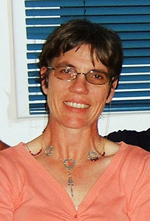 SDEROT, Israel—Nitzan and Shaked Shreiber are 18-year-old twin sisters from Sderot who have just graduated from the Shikma School situated in Kibbutz Yad Mordechai. SDEROT, Israel—Nitzan and Shaked Shreiber are 18-year-old twin sisters from Sderot who have just graduated from the Shikma School situated in Kibbutz Yad Mordechai.
For their graduating project in art, they both sought to express their feelings and explain how it is to live in the constant shadow of the Kassam rockets fired by terrorists at them from across the border in Gaza.
Their art teacher Rami Levi who lives in Kibbutz Ruhama but works at the Shikma school of Kibbutz Yad Mordechai helped and tutored them along the way.
Levi contacted the sisters in behalf of San Diego Jewish World so that this publication could bring both their thoughts and their art to readers.
Here are their stories in their own words:
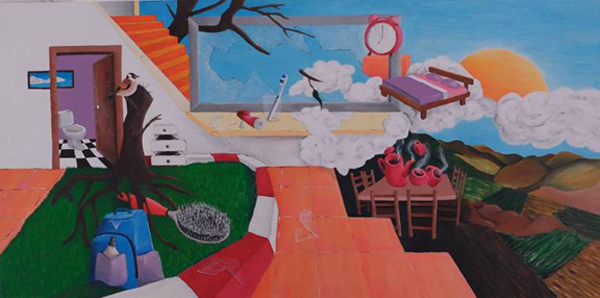
'There were no injuries and no material damage'
By Nitzan Shreiber
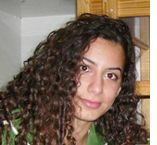 The Kassam rocket attacks in Sderot (the city I live in) has become part of my life. I have lived with these experiences for seven years. Seven years where the peaceful moments turns into disturbing and worrying times, seven years of mornings with each Kassam as a reflection of something surrealistic. The Kassam rocket attacks in Sderot (the city I live in) has become part of my life. I have lived with these experiences for seven years. Seven years where the peaceful moments turns into disturbing and worrying times, seven years of mornings with each Kassam as a reflection of something surrealistic.
In a surrealistic style, like that of Rene Magritte, I describe all the regular and banal things I do in the morning. There is my hairbrush, the school bag ready for the day ahead, the alarm clock next to my bed, the square where I used to wait for my ride to the school, the square where not long ago two brothers were seriously injured, and as a result of the Kassam attack one of them lost his leg. All the details in the picture are part of the reality but bound together with other parts in the picture and as such the composition creates an imaginary and hallucinating surrounding.
I entered the broken window as a symbol of how fragile my soul is as a consequence to the situation and also as a symbol of the existing Arab-Israeli conflict. The density in the picture is a way for me to express the non existing tranquility, and the absent quiet which usually symbolizes the mornings (and days) of my life—the hours of the morning when waking up and getting ready for school have turned into tasksthat must be overcome quickly and safely.
"There were no injuries and no material damages" has become one of the headlines that runs in the media constantly. It leaves us with a sigh of relief – but only theoretically. This headline mirrors for me and my friends a mistaken reality. After each rocket attack I feel my soul is wounded; helplessness and hurt winds up inside me and it gets worse and worse as time goes by. It seems that the media has a major interest when people are injured and material damage encountered, but the psychological affect on the citizens are forgotten. Slowly the public through the media has adopted the mistaken reality that this is something that we can live with and that it is not that bad since "there were no injuries and no material damage".
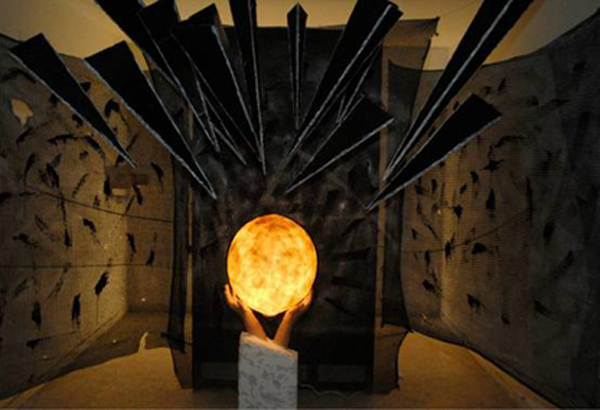
A prayer for silence
By Shaked Shreiber
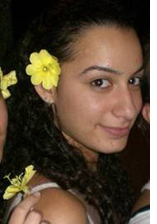 In my opinion, the life in the shadow of the Kassam rockets is a life with no internal calmness and a feeling of insecurity. In this existence I dream of something serene, fulfilling and optimistic. In my opinion, the life in the shadow of the Kassam rockets is a life with no internal calmness and a feeling of insecurity. In this existence I dream of something serene, fulfilling and optimistic.
My artwork presents a situation of vulnerability with me in the center.
The optimistic light ball is the "fulfillment," the "symmetry," and it symbolizes the psychological tranquility that I am searching for.
The light ball has the form of an egg which demonstrates the fragility and the sensitivity of the ball.
I used metaphors in an attempt to express my feelings.
The hands that hold the ball symbolize the strength I have to hold on to. And the fragile tranquility, the light, equals hope.
The harsh reality – the darkness around me makes is difficult to express the horrors I feel when the Kassam rocket attacks, the hands are tied and it is difficult to hold on to the light ball.
The "sharp points" that "threaten" the light ball looks like they are going to explode it. These points represent the rockets - the outside and the existing daily threat. This threat upsets the psychological serenity and my personal security.
The threatening look of the "sharp points" shows distinct tension and sensitivity and it expresses that at any moment the ball can explode.
This tension creates an atmosphere that senses the abuse and fragility of the peace and quiet, as well as the enormous power that enters from outside— something that I am not in control of.


THE POLITICAL GROTTO
Father and daughter both made some new friends on Single Parent Family Weekend
By Gary Rotto
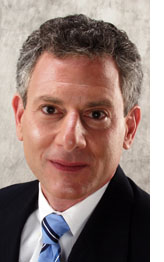 ANGELUS OAKS, California—I didn’t give my daughter the choice. I decided that we were going away for the weekend to the Single Parent Family Weekend at Camp Mountain Chai. “We’re going away to Camp this weekend. Let’s go over the list of what to bring and we’ll pack on Thursday night,” is what I told her. As a single parent, I have my daughter every Thursday night, so while it might seem like packing at the last minute, it was a practical decision so that we could do this together. And it was my weekend, so I had the flexibility to choose what we would do this weekend. ANGELUS OAKS, California—I didn’t give my daughter the choice. I decided that we were going away for the weekend to the Single Parent Family Weekend at Camp Mountain Chai. “We’re going away to Camp this weekend. Let’s go over the list of what to bring and we’ll pack on Thursday night,” is what I told her. As a single parent, I have my daughter every Thursday night, so while it might seem like packing at the last minute, it was a practical decision so that we could do this together. And it was my weekend, so I had the flexibility to choose what we would do this weekend.
I signed my daughter out of San Diego Jewish Academy early on a Friday so that we could take the bus to camp. The price of gas made the decision to take the bus enticing, but the bus ride also is where you first get to know people and is a part of the camp or any weekend experience. You never know who you might meet. One mom is the daughter of one of my former board members at the American Jewish Committee. Another I recognized from an internet dating site and introduced myself. Another came up to me that evening to introduce herself as she is in my ex-wife’s book club. (Fortunately, my ex-wife and I get along very well.)
I hadn’t asked any of my friends if they were planning on attending this year. I just made an assumption that some of my friends would sign up and if they didn’t, I’d make new friends. Up until the bus was about to leave, I knew only Doreen Prager, the Adult Programs Coordinator at the Jewish Community Center, and her kids, Jenna and Parker. That was it. But then my friend Steven Brody and his son arrived. He was as pleasantly surprised to see me as I was to see him. Ok, time for Doreen to check the attendance list. And as I looked around, my quick mathematical skills determined that there were two single dads and many single moms. I hadn’t anticipated this, but I certainly was not going to argue with the results. I had three goals for the weekend: to strengthen my relationship with my daughter, to meet new people and to introduce my daughter to sleepaway camp.
I was last at Camp Mountain Chai for a very brief time – only an afternoon – as a presenter at the Big Boys Weekend in April. This time, I was a full fledged camper. So upon arrival, we were greeted by Alan Friedman, the camp’s executive director, David Zimmerman, the administrative director and Joanne Morganthal, the camp director. Jewish Family Service was an integral part of the weekend with Debra Stern-Ellis, director of community services; Bonnie Rainey, coordinator of the Supporting Jewish Single Parents Program; and Elizabeth Marshall, coordinator of Jewish Big Pals, facilitating various weekend programs.
After checking in and finding our rooms, the kids played on the playground or on the field. Adults met and talked and played alongside our kids. There certainly was ample time to chat at the Oneg Shabbat and later at the adult social as well as during other times during the weekend. We had pluralistic, kid-friendly services during Shabbat as well as electives – one track for the kids and the other for the adults.
Saturday began with breakfast and Shabbat Services which led into our elective programs. For the Saturday electives, I chose a session on Positive Family Communications and then a yoga session. After lunch, I was part of the hiking group that made its way down to a beautiful stream and mini-waterfall.
Family free time occurred during the late afternoon portion of Shabbat. My daughter and I ventured to the climbing wall and the “ropes course.” Not wanting to admit to my daughter my fear of heights, I supported her desire to try the Leap of Faith. This is where you climb a 25-foot tall telephone pole and leap off a platform no larger that the size of your two feet, attempting to hit a cow bell suspended 10 feet out from the pole.
Fortunately, you’re in a harness and tethered to an instructor who is counterbalancing you. My ten year old daughter did this leap three times. Gulp. I tried the Broken Bridge, a series of wooden planks suspended 25 feet off the ground. After successfully conquering that event, I ventured over to the Leap of Faith. My daughter encouraged me to try it, but I was non-committal. So JM, one of the moms with whom I became friends, shouted something like, “Oh come on, don’t be a wuss.” So not wanting to disappoint my cheerleading squad, I ascended the pole, set myself quickly and leaped Superman style off the platform. Then onto another challenging task: making a family challah cover. After dinner, we marked the end of Shabbat with Havdallah and a family scavenger hunt. And my quiet lobbying during dinner resulted in a campfire and the ultimate camp dessert: Smores.
From special weekends for congregations to family camp weekends to weekday experiences for school children in the Orange County school districts, Camp Mountain Chai is a year-round experience. This experience was co-sponsored by the JCC Single Parent Program and JFS Supporting Single Parents programs. The costs for parents and kids was very, very reasonable. Cost to events can be a barrier in our community. And certainly, several families on the trip might not have been able participate without the subsidy. .
By the way, when I asked my daughter about the experience as we packed up on Sunday morning, she said,”Dad, I would have said that I didn’t want to go. I didn’t know if I would know anyone. But I’m glad that I did. I made some new friends who I want to stay in touch with. And I had a great time with you.”
My sentiments exactly on both accounts!


Astronaut, centenarian address San Diego conference on aging and independence
By Gerry Greber
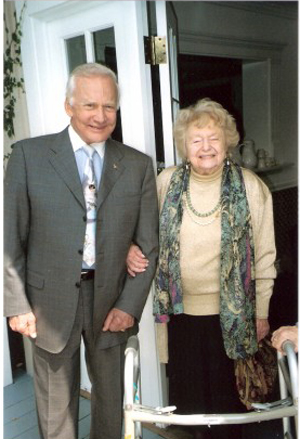
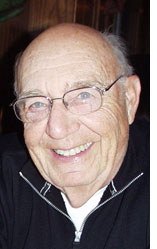 SAN DIEGO—Former astronaut Buzz Aldrin, who in 1969 became the second man to walk on the moon, and Laura Simon, 102, author of the autobiography I'm Still Here have achieved heights in altitude and in age that most people never achieve. SAN DIEGO—Former astronaut Buzz Aldrin, who in 1969 became the second man to walk on the moon, and Laura Simon, 102, author of the autobiography I'm Still Here have achieved heights in altitude and in age that most people never achieve.
The two were among the speakers at a June 26 conference on Aging and Independent Services sponsored by the County of San Diego.
Aldrin, 84, told the conference he believed that individuals should continue to work on projects they know will not come to fruition until long after they themselves have left the scene. For example, he said, he has worked to promote travel between Earth and Mars, a journey that may not eventuate for another 25 years.
Simon advocated that seniors live independently and "control their own destiny" for as long as they are able. "Everyone likes to tell seniors what to do," she said. But, she added, "they should follow their own intuition. Think independently, control your mind and remember that what is right for others may be wrong for you."
Simon, who is Jewish, told the conference that her book is now being used in gerentology courses at San Diego State University. As Simon is legally blind, it took over nine years to complete because she had to dictate her thoughts into a tape recorder, then have them transcribed.


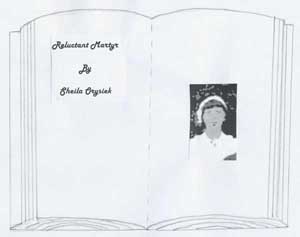 Editor's Note: This is the 14th chapter in our serialization of Reluctant Martyr, a historical novel by our columnist Sheila Orysiek. It is based on the experiences of her aunt. In each Friday-Saturday edition of San Diego Jewish World, we will run another installment of the 21-chapter book until its conclusion. We thank Sheila for granting us first publication rights to her book. Comments to the author are welcome at orysieks@sandiegojewishworld.com Editor's Note: This is the 14th chapter in our serialization of Reluctant Martyr, a historical novel by our columnist Sheila Orysiek. It is based on the experiences of her aunt. In each Friday-Saturday edition of San Diego Jewish World, we will run another installment of the 21-chapter book until its conclusion. We thank Sheila for granting us first publication rights to her book. Comments to the author are welcome at orysieks@sandiegojewishworld.com
Chapters 1 2 3 4 5 6 7 8 9 10 11 12 13 14 15 16 17 18 19 20 21
Reluctant Martyr—Chapter 14
A year and a half later a tailor opened a little shop next to the fish market on 40th Street. The Latvian neighbor who lived next door to Hannah said she was very pleased with some alterations the tailor had done and that he also sold second hand men’s suits. So, Hannah took over two of Jahn’s shirts on which the collars needed to be turned. It was a warm spring day and Sharona accompanied her. The tailor was sitting at his black pedal driven sewing machine when they walked in but he came quickly to the counter and greeted them cheerfully. “Yes, ladies, how can I help you?” He had warm brown eyes, a friendly face and a bald head. Hannah showed him what she wanted and he smiled and nodded, “Yes, yes, of course! It will be finished in three days. Please to come back then. Thank you, ladies!” He held the door open and practically bowed as they left.
Three days later when Hannah returned alone to pick up the shirts, he looked slightly disappointed. “Mrs. ...where is the other lady? Is she your mother? I hope she is well.”
“Yes, thank you for asking. She is fine.” Hannah looked at the shirts that he had not only completed but had ironed as well. “This is well done, you do fine work.” That made him quite happy, however he looked as though there was something else he wanted to say, so she hesitated for a moment, but he shook his head and just warmly thanked her for her business.
The following week Hannah went to Mr. Becker’s grocery and there was the little tailor. He came up to her and almost bowing said, “Please, lady, if I may be so forward, let me introduce myself.” When she didn’t turn away he continued, “I am Istvan Molovsky, originally from a small town near Kiev.”
Hannah took his proffered hand, “I am Hannah Perris, pleased to meet you.” She turned to go, but he was not quite done.
“Once again, lady...Mrs. Perris, I ask your forgiveness, but I was hoping you might, if you please, might introduce me to your mother?”
Hannah smiled; there was something so sincere about him. “Next time I come, if mother’s with me, perhaps.” She had to go; Mr. Becker was waiting to get her groceries. When she got home she mentioned the tailor to Sharona, but it was soon forgotten. Hannah gave the episode very little thought; after all, in her estimation Mr. Molovsky was only a tailor.
Several months later on a very hot, sultry August day, Sharona walked over to the produce store and bought a day’s supply of fruits and vegetables. When once again outside she noticed the sky had darkened considerably and a summer rainstorm was threatening. Next she stopped at the fish market. Everything there was still the same, the fish still swam about inside wooden tubs, the floor was wet and it smelled overwhelmingly of living and dead fish. She picked one out, the shopkeeper netted the creature and took it in the back to kill and wrap.
As she walked along the street the rain dropped like a curtain from the purple clouds. A terrifying flash of lightening was very close, followed almost instantaneously by a deafening clap of thunder. Sharona reeled backward and into the doorway of the tailor’s shop. The wind was blowing the rain in slanted sheets right against her and so she quickly opened the door and sought shelter inside. The tailor considered this fortunate and hurried forward to reassure her, but was careful to remain behind the counter.
“Please,” he said, “please sit down. Stay till the rain is over,” as he indicated a chair. “I have met your daughter, Mrs. Perris.” And nodding friendliness at her, and still with the counter between them, he introduced himself. “I am Istvan Molovsky, pleased to meet you.”
“I am Sharona Samuel, pleased to meet you, too.”
As quickly as it started the storm raged off into the distance and Sharona stood up to leave. Her purchases were in several bags and she picked them up rather awkwardly. He came from behind the counter. “Please, Mrs. Samuel, let me help.” When she did not refuse he gathered them in his hands.
“I do not have a cart...and...my house is three blocks away...”
“If you will allow me, I will carry them for you, if you please.” His smile was infectious and she felt the sincerity of his offer.
“Thank you, Mr. Molovsky.”
He pulled the shop door closed. As they walked along 40th Street, the wet pavements were steaming in the returned sunlight. They turned the corner at Mr. Becker’s grocery and walked along Cambridge, went by Mr. Gutmann’s store, and crossed into State Street. Istvan told her where he was from and it was not far from where she had lived in Russia. He asked how her daughter was; she mentioned how hot the last few days had been. In front of the house she took the packages and thanked him.
“Mrs. Samuel, would it be possible...perhaps...I might call on you sometime?” he asked shyly.
“That would be nice, Mr. Molovsky. Thank you again.” And she went in.
Istvan was pleased with his success until he realized he hadn’t asked her when it would be convenient. But the most important thing was she hadn’t refused. When he got back to his shop the pedal on his sewing machine hummed along merrily the rest of the afternoon.
Sharona thought about it. There was a warmth about him. An endearing hesitancy and very nice brown eyes and a catching smile that lit up his face. Several days later she sent Etah over to the shop with an invitation for him to come to a Friday night Sabbath supper. Though it might be thought rather bold to invite an almost total stranger to supper, Sharona felt better about meeting this man in the safety and comfort of her home and family. Hannah was not at all happy with this arrangement. She considered herself and her family above association with a tailor. It was of course necessary to be courteous and exchange greetings in his shop, but having him to supper, she felt, was going much too far. It was ironic that the mother was far more willing to bend with the times than the daughter.
On Friday night, promptly at 6 p.m., the doorbell rang. Sharona herself came to answer it and luckily the day had not been too warm, because he came in a three piece suit, tie and hat. “Good evening, Mrs. Samuel,” he said.
“Won’t you please come in Mr. Molovsky? May I take your hat?” She put it on the top of the sideboard in the dining room and then she showed him into the parlor. “This is my son-in-law, Jahn Perris.” Jahn rose to shake hands. Then turning to her two daughters who came in from the dining room, “This is my eldest daughter Hannah, whom you have already met, and my youngest, Etah.”
“So pleased to meet you.” He greeted each one very cordially.
“Please, Mr. Molovsky,” Sharona said, “would you have a seat, my son-in-law is listening to the news, I’ll go back to finish cooking dinner.
Istvan and Jahn sat down and listened to the radio and politely discussed some recent events and the women returned to preparing the meal and setting the table. Soon all was ready and everyone sat down to supper. Sharona recited Sabbath blessings over the candles, Jahn blessed the bread and wine and then they began to eat.
“Do you have any children, Mr. Molovsky?” Sharona asked.
“Yes...no...yes, they are all grown up and I haven’t seen them in a while. They live in another state.”
“You must miss them very much,” Sharona replied.
He was very quiet for a moment and then turned to her. “May I ask you, would you call me Istvan?”
She smiled and said, “No...not unless you call me Sharona.”
“I would be most happy.” His face radiated with warmth.
Talk during the dinner turned to Istvan and his life in Eastern Europe. They learned that he had escaped before the Russian Revolution and had been in the Russo-Japanese War as an involuntary conscript. His sewing had saved his life during the war as he was ordered to sew for the officers and it kept him out of the actual fighting. His wife had died many years before and his children were grown and gone and he was basically alone.
After supper the dishes were cleared away. Everyone was on their good behavior and no one suggested playing cards, however, that did not include Sharona. The imp in her soul came bubbling out and she thought it would be a good test of his sense of fun. Thinking it might be best to know these things right off, she asked Etah to get the cards. Hannah looked at her mother in shocked disbelief. After the initial surprise of playing cards on the Sabbath, he relished the idea and happily joined in; he even knew the game. Hannah sat next to Sharona and whispered in her ear.
“Surely, you’re not going to pull any of your old tricks, mother. Not tonight!”
Out loud Sharona replied, “Well, if I’m losing I will! You know I like to win!”
“Do you have a special trick to win?” Istvan asked her.
“Yes.” She looked at him with a sly grin. The rest of the family held its collective breath. “I cheat!” she explained, and she flipped an unwanted card that flew through the air across the table. He turned and looked at her. Her eyes were wide and innocent. Laughter was tickling her lips. After a lengthy pause, he started to chuckle, and then laughed till his eyes ran.
“What a simple solution!” he exclaimed. The family was relieved the secret was out.
It was apparent from the very beginning that Istvan loved Sharona. She allowed him to call more and more often. He lived alone in two small rooms behind the tailor shop and had been without a family for a long time. He loved being in the house on State Street and soaked up the warmth of the people there. He readily accepted Sharona’s family as his and Sharona’s children as his children. His own seemed to have completely forgotten him.
Sometimes both he and Sharona walked across Girard Avenue to Fairmount Park, and sat under a large oak tree on the cloth folding chairs they brought with them. They talked, ate a sandwich and watched their neighbors go by. Or, on a Sunday, when all the stores were closed, they would take the El and ride downtown and simply look in the store windows, walking slowly along Market Street or Chestnut. Another favorite outing was to have lunch at the automat in center city and then sit for a couple of hours and just watch the world go by. One day they went the other way on the El and got off at 69th Street and wandered around through the shops and farmer’s market.
When Passover came that year, it was held as usual at Uncle Joseph’s house and Sharona invited Istvan to come. He had not been to a family Passover Seder in many years and was overjoyed to be included. Aunt Nora, however, was not at all happy when she learned he was a tailor. She considered that very low on the ladder of economic success. She asked Sharona how she could possibly see anything in this man...this tailor!
Sharona, with her good streak of practical common sense intact, had different priorities. She found him to be a warm, loving person, decent and honorable. His means of earning a living was honest and hard working and she saw that as an asset. Sometime during that spring he asked her to marry him. At first, she said yes. They set a date for early summer but events happened in that household that was to interrupt their plans.

.

San Diego County Jewish Trivia Music
Adapted from San Diego Trivia (1989) and San Diego Trivia 2 (1993)
{Editor’s Note: Retired librarian Evelyn Kooperman, a friend to the Jewish community, enjoys playing the cello and collecting trivia about her native city of San Diego. This column excerpts Jewish communal items from her two books, San Diego Trivia (1989) and San Diego Trivia 2 (1993). Readers should note that the information has not been updated since the books were published. Kooperman still has a limited supply of the two books, which cover the general San Diego community in all its aspects. Either of the two volumes sells for $5 and may be obtained by telephoning the author at (619) 461-6095.}
By Evelyn Kooperman
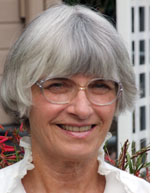 SAN DIEGO—Q1: What oratorio by Dr. David Ward-Steinman premiered in San Diego in 1964 with Gregory Peck as narrator? SAN DIEGO—Q1: What oratorio by Dr. David Ward-Steinman premiered in San Diego in 1964 with Gregory Peck as narrator?
Hint: Dr. Ward-Steinman was then assistant professor of music at San Diego State and the San Diego State Chorus and Orchestra was led by conductor Paul Anderson
Q2: In 1992 what San Diegan was the first conductor to be invited to the newly independent country of Lithuania to conduct recording sessions with Lithuanian National Philharmonic?
Hint: He founded the Jewish Community Center Orchestra, now known as the Tifereth Israel Community Orchestra.
Q3: What UCSD professor is most frequently recorded contrabass soloist in this country?

Remember your loved ones on-line
Would you like to honor a friend's or relative's special simcha such as a birthday, wedding, anniversary, election or special award? Or would you like to memorialize a loved one? Now you can become a sponsor of one day’s edition of “Adventures in San Diego Jewish History” (see today's edition below) by sending a check for $18 to the Harrison Enterprises, publishers of San Diego Jewish World, P.O. Box 19363, San Diego, CA 92159.
Please indicate what date you would like to reserve, and the occasion that you wish to honor or memorialize, and be sure to include your phone number in case we have questions. In the event that more than one person seeks a particular date, we will run all such submissions at the same time. The editor encourages items of interest to the Jewish community, and reserves te right to reject any that might be deemed inappropriate.
These memorializations and honors will be archived along with the rest of "The Adventures in San Diego Jewish History," providing your family and friends with an internet searchable reference.
A separate opportunity to memorialize a loved one is through the Louis Rose Society for the Preservation of Jewish History, the archives of which are posted on this website as a service. For $36, each member of the Louis Rose Society is entitled to memorialize or honor one member of the San Diego Jewish Community. Additional honorees may be honored for $18 per person. Tax-deductible checks for the Louis Rose Society's program may be mailed to the Jewish Community Foundation/ Louis Rose Fund, 4950 Murphy Canyon Road, San Diego, CA 92123.
Please consider honoring someone by sponsoring a daily history edition and by joining the Louis Rose Society. If you have questions about either, please call Don Harrison, San Diego Jewish World editor, at (619) 265-0808, or contact him at editor@sandiegojewishworld.com.
|

ADVENTURES IN SAN DIEGO JEWISH HISTORY
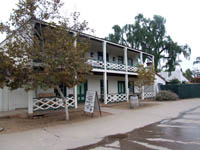
Robinson-Rose House
|
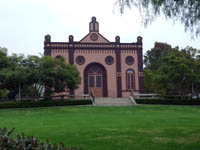
Old Temple Beth Israel |
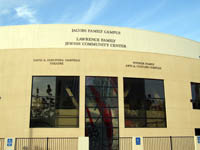
Lawrence Family JCC |
Editor's Note: We are reprinting news articles that appeared in back issues of various San Diego Jewish newspapers. You may access an index of the headlines of those articles by clicking here. You may also use the Google search program on our home page or on the headline index page to search for keywords or names.
Pioneer Women
From Southwestern Jewish Press, May 22, 1947, page 6
By Bess Borushek
The proverbial saying of ‘anticipation is greater than realization’ has to be transposed in reporting on our annual Schevuouth Dinner held Sunday, May 18th, since its outcome proved so much more successful than anticipated.
The dinner sponsored by Mr. and Mrs. Charles Press in honor of their 25th anniversary and help appropriately on the 13th birthday of their daughter, Edith, had a capacity attendance. The invocation was given by Rabbi Rosenblum who later in the evening also gave a brief discourse on the observance of ‘Shevouth’
Following the dinner, a tuneful musical program entertained the guests. Chaveras Press and Weitzman arranged the program consisting of an ensemble including Esther Weitzman and several of her schoolmates and Mr. J. Rosenthal and his sons. Their rendering of numerous Jewish folk songs provided most delightful entertainment, and was highlighted by the playing of the Anniversary Waltz in honor of the Presses.
However, despite the merriment, the purpose for which the dinner was given was not forgotten as the guest speaker of the evening Chavera Tania Bercutt, from the Los Angeles Council, made a most eloquent and stirring appeal on behalf of the Child Rescue Fund and the response was most generous and gratifying.
Compliments are in order to Chavera Press as chairman and sponsor of the dinner and to her capable committee for their planning and execution of this affair for Child Rescue Fund.
Eli Levenson Praises Chairmen In Making Final Welfare Fund Appeal
From Southwestern Jewish Press, May 29, 1947, page 1
Complimenting Max Rabinowitz and Louis Steinman, Chairmen of the 1947 United Jewish Fund Campaign, for their efforts and their work, Eli H. Levenson, President of the United Jewish Fund, said “through the energy of these two men and their workers $187,241 has been secured for overseas, national and local needs.”
Of the money raised at least 75% will be forwarded to the United Jewish Appeal on behalf of the Joint Distribution Committee, the United Palestine Appeal and the United Service for New Americans according to a report from the preliminary meeting of the Allocations Committee under the Chairmanship of Victor Schulman. The balance of the money will be used for national and local needs.
Max Rabinowitz and Louis Steinman, Chairman of the Campaign have received reports from the Women’s Division led by Mrs. George Neumnan, Chairman, which has raised $26,993; the Young People’s Division led by Renee Perlmutter and Sallie Stone have gone over the top with $5,342; the trades and Businessmen’s Division which has raised $115,959. The Citizen’s committee under the Chairmanship of George Scott has raised $7,721.
Mr. Levenson, President of the Fund, in making a final appeal to the community stated that the United Jewish Fund desperately needs everyone’s help in the next week and urged everyone to send their contribution to the office now.
Hillel Councilorship at State College a Possibility
From Southwestern Jewish Press, May 29, 1947, pages 1, 5
Fifty interested students of San Diego State met at dinner last Tuesday evening at San Diego Club with officers of Lasker Lodge of B’nai B’rith to discuss the feasibility of establishing a Hillel councillorship on their campus.
Among the speakers to the group were two classmates, Hadarah Domnitz and Ruth Field, who, with Morrie S. Kraus and Edward Breitbard, attended a Hillel Institute in Glendale the week before. These young ladies were much impressed with the program Hillel embraces and spoke effectively in favor of the Councilorship here.
Jack Winnick, who is the student director of Hillel on the university of Southern California campus in Los Angeles also spoke and told in detail of the many phases of the five point program there and how students benefit by participating in all of them. “To have a good leader,” said Jack, “you have to have good followers, well-informed, intelligent followers; and Hillel will train you for community leadership.” Albert A. Hutler executive director of the local United Jewish Fund, who was the student director of Hillel in 1931 on the University of Illinois campus was asked to tell how the group functioned then, which Mr. Hutler did very capably. Much progress in their work has been made since that time, although the original program as it was set is still working.
The principal speaker of the evening was Rabbi Judah M. Cohn, Western Regional Director of Hillel, who told the audience what preliminary steps had been taken so far for the establishment of the Hillel Councilorship at State College. Much groundwork has been laid and Rabbi Cohn was confident that all the Jewish students at State would recognize the benefits to Judaism as well as to themselves and their community by their active participation in such a program. He elaborated on the work being done on the 166 campuses to date and fervently hoped that San Diego would be the 167th group for Hillel.
After a good discussion of questions and answers between the students present and the speakers and committee, at which every eventuality was brought up by the thinking students, a vote was taken to determine the main question. By an almost unanimous vote, the group decided to establish a Hillel Councilorship at San Diego State College this fall. To bring this about, a steering committee of the stuents was formed immediately, which committee will meet with Rabbi Cohn, the Lasker Lodge committee and the Councilor to be appointed for them to draft a Constitution and plan an effective program to put into action with the beginning of the fall semester.
*
DEDICATION—Today's edition of "Adventures in San Diego Jewish History" is dedicated with love by San Diego Jewish World editor Don Harrison to his brother, William Edward Harrison, currently a resident of Ventura, who is celebrating his 68th birthday today, June 27. Mazal tov, Billy!
{Return to top}

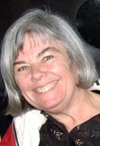 Nancy Harrison Nancy Harrison
cruise & tour specialist
(619) 265-0808

SAN DIEGO JEWISH TRIVIA ANSWERS: 1) The Song of Moses; 2) David Amos;
3) Bertram Turetzky

SAN DIEGO JEWISH WORLD THE WEEK IN REVIEW
Middle East
Olmert, every crafty, may survive again by Ira Sharkansky in Jerusalem
The Arts
Debra Winger's memoir shows she can write as well as she can act by Yvonne Greenberg in La Jolla , California
Star Trek exhibit in San Diego provides Jewish visitors with reasons to kvell by Donald H. Harrison in San Diego
Temple Emanu-El and San Diego Musical Theatre are saying 'Bye, Bye ECPAC' by Carol Davis in El Cajon, California
Thursdays with the songs of Hal Wingard:
—No. 256, Youthful Love
—No. 215, Love Notes
—No. 104, Everything Is Sexual
Adventures in San Diego Jewish History
Remember Your Loved Ones On-line
—May 22, 1947: JWV Auxiliary
—May 22, 1947: Beth Jacob Congregation
—May 22, 1947: Jewish War Vets
—May 22, 1947: Lasker Lodge B.B.
Middle East
Are the French modern-day Delilahs? by Shoshana Bryen in Washington, D.C.
No time for electioneering, Israeli mayors in the Negev tell two Ehuds by Ulla Hadar in Sderot, Israel
Australia
A roundup of Australian stories by Garry Fabian:
—Long-running archives saga ends positively
—US academics travel 'Down Under'
—Refugee Week: time for reflection, action
—Church 'Middle-East statement' draws mixed reactions
—Melbourne Community-Victoria Police Dinner
—The environment and 'the Jewish question'
—Bipartisan politicians visit Jewish Holocaust Centre
—Canberra books a place in Jewish history
—Queensland Opposition Leader at AICC
—Perth Walks for JNF
—Can your boss make you work on Shabbat?
—Pratt steps down from Blues, but AJAX remains firm
—Chabad centre protested by neighbours
The Arts
Remember, a poem by Rebecca Rudin in San Diego
Cantor becomes a conductor—of a tour by Eileen Wingard in La Jolla, California
Adventures in San Diego Jewish History
Remember Your Loved Ones On-line
—May 22, 1947: That's What I Think by Ray Solomon
—May 22, 1947: S.O.S. Wants Books!
—May 22, 1947: Home Camp Registration Now Being Taken
—May 22, 1947: Rabbi Wolf to Speak For Sisterhood
The Arts
What You See Isn't Quite What You Get by Ronit Hakakha in Netanya, Israel
The awful revenge of a mediocre artist by Donald H. Harrison in San Diego
TICO builds reputation as soloist's haven by Eileen Wingard in San Diego
Adventures in San Diego Jewish History
Become a sponsor of the ‘Adventures’
—May 8, 1947: Victor Schulman Heads Allocations, Budget Committee
—May 8, 1947: Hadassah
—May 22, 1947: Flash! {Hillel}
—May 22, 1947: Women Raise Record Sum
Middle East
How Sha'ar Hanegev elementary school protects Israeli kids from the rockets by Ulla Hadar in Kibbutz Ruhama, Israel
Possible attack on Iran, negotiating for hostages prompt many ethical questions by Ira Sharkansky in Jerusalem
Israel is now appeasing its Arab enemies by Shoshana Bryen in Washington, D.C.
San Diego
Jewish-Catholic dialogue focuses on the crucifixion and on the Holocaust by Donald H. Harrison in Cardiff-by-the-Sea, California
Adventures in San Diego Jewish History
Become a sponsor of our ‘Adventures’
—April 24, 1947: Lasker Lodge B.B. {Hillel}
—April 24, 1947: Jewish Labor Com
—April 24, 1947: Birdie Stodel B.B.
—April 24, 1947: Variety Show Saturday Nite
The Arts
My Old Friends a joyful romp of the aged by Cynthia Citron in Burbank, California
A Jewish dancer’s road to freedom by Sheila Orysiek in San Diego
)Middle East
Murtha owes Marines an apology by Shoshana Bryen in Washington, D.C.
Judaism
Conservative movement insists kosher processors treat employees humanely by Rabbi Leonard Rosenthal in San Diego
The importance of a Hebrew name by Rabbi Baruch Lederman in San Diego
San Diego
Garden and square memorialize two favorite professors at San Diego City College by Donald H. Harrison in San Diego
Adventures in San Diego Jewish History
—April 24, 1947: 'And A Little Child Shall Lead Them'
—April 24, 1947: Beth Jacob Congregation
—April 24, 1947: S.O.S. Still Needs Your Support
—April 24, 1947: S.D. To Have Summer Camps
The Arts
S.D. weighs festival of new Jewish plays by Carol Davis in San Diego
Middle East
Costs, benefits to Hamas regularization by Eran Lerman in Jerusalem
Wars among the Jews heat up in Israel by Ira Sharkansky in Jerusalem
U.S. and Israel prefer stability among Arab nations rather than real democracy by Shoshana Bryen in Washington, D.C.
San Diego
UJF backs programs to transport local seniors, build school in Sha'ar Hanegev by Donald H. Harrison in San Diego
Jackie Gmach receives Marla Bennett Humanitarian Award from AFMDA by Yvonne Greenberg and Paul Greenberg in La Jolla, California
Adventures in San Diego Jewish History
—April 10, 1947: Organizations 'working with' UJF
—April 10, 1947: USO-JWB Activities
—April 24, 1947: San Diego Sends $50,000 From Emergency Fund To Aid European Jews
The Arts
Chapter Thirteen of Reluctant Martyr, a serialized novel by Sheila Orysiek of San Diego
Link to previous editions
< BACK TO TOP
|
|
